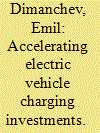| Srl | Item |
| 1 |
ID:
191354


|
|
|
|
|
| Summary/Abstract |
Replacing conventional cars and trucks with battery electric vehicles requires a rapid expansion of fast-charging infrastructure. However, private sector charging infrastructure investments are delayed by unfavorable project economics and uncertainty in future demand. Prior research has addressed the former using standard net present value (NPV) methods, but neglected the latter. To address this gap, this paper introduces a real options model of charging investments, which quantifies the option value of delaying investment under uncertainty. We use this model to assess the implications of optionality in a representative case. Our analysis provides indicative estimates of how investment timing is impacted by alternative policy options: grants, long-term contracts, demand charge re-design, and Zero Emission Vehicle standards. We estimate that if grant subsidies are informed by a traditional NPV analysis, firms would delay investing by more than 5 years. Perhaps surprisingly, even low levels of risk incentivize long delays. We find that policies targeting optionality are substantially more cost-effective than the traditionally used grants. Specifically, we calculate that long-term contracts for differences can trigger immediate investments at a cost 68% lower than grants. A simpler but relatively cost-effective alternative is to introduce a phase-out schedule for grants to discourage investment delays.
|
|
|
|
|
|
|
|
|
|
|
|
|
|
|
|
| 2 |
ID:
180158


|
|
|
|
|
| Summary/Abstract |
Highway fast-charging (HFC) stations for electric vehicles (EVs) are necessary to address range anxiety concerns and thus to support economy-wide decarbonization goals. The characteristics of HFC electricity demand – its relative inflexibility, high power requirements, and spatial concentration – have the potential to adversely impact grid operations as HFC infrastructure expands. Here, we investigate the impacts of scaled-up HFC infrastructure using an operations model of the 2033 Texas power grid with uniquely high spatial and temporal resolution. In the reference EV penetration case corresponding to 3 million passenger EVs on the road, we find that grid-HFC interactions increase system annual operational costs by 8%, or nearly $2 per MWh of load served. Greater impacts are observed for higher EV penetration cases. The high spatial resolution of the analysis reveals that the majority of increased costs can be attributed to transmission congestion on feeder lines serving a minority of HFC stations. Four-hour battery energy storage is shown to be more effective than demand flexibility as mitigation, due to the long duration of peak charging demand anticipated at HFC stations. Transmission network upgrades can also effectively mitigate grid-HFC interactions. Choosing the most effective mitigation strategy for each station requires a tailored approach.
|
|
|
|
|
|
|
|
|
|
|
|
|
|
|
|